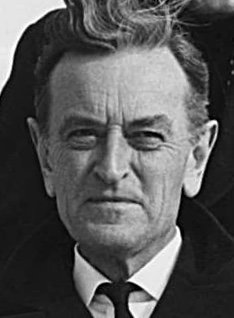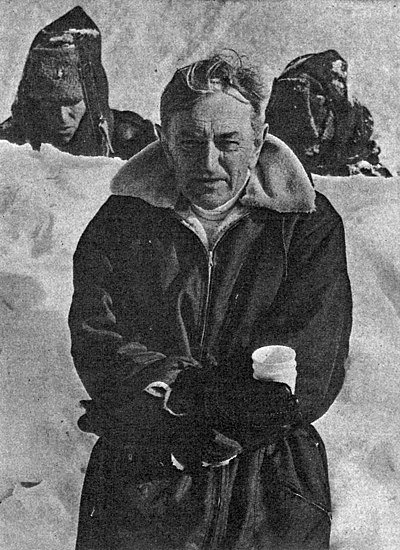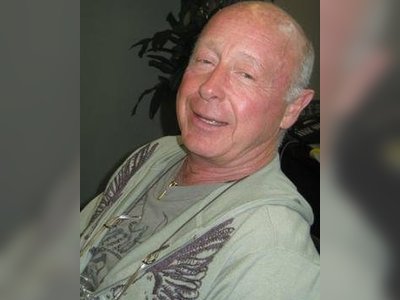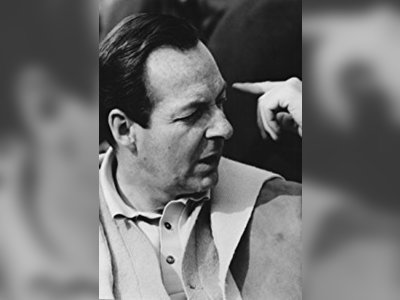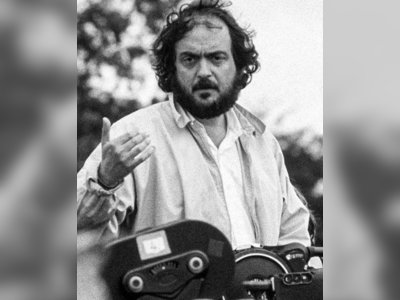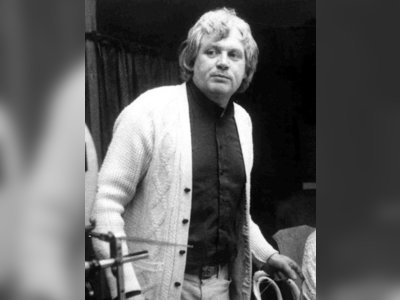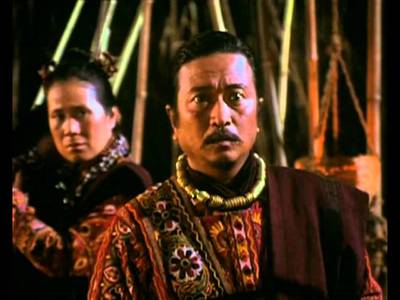British Heritage
Remember, Cherish, Learn.
beta
David Lean - Director of The Epics
Contribution to British Heritage.
Sir David Lean, a prominent figure in the world of cinema, left an indelible mark on British heritage through his remarkable films and contributions to the art of filmmaking. He was an English film director, producer, screenwriter, and editor, best known for directing grand-scale epics that have become timeless classics. Lean's films not only showcased the beauty and grandeur of British landscapes but also explored the complexities of human emotions and societal struggles, making him one of the most influential directors of all time.
David Lean's legacy lies in the powerful and visually stunning films he created, which continue to captivate audiences and inspire filmmakers worldwide. His work has been celebrated by critics and directors alike, earning him numerous awards and accolades throughout his career. Even after his passing, Lean's films remain a testament to his mastery of storytelling, cinematography, and his ability to bring compelling narratives to life on the big screen.
David Lean was born on March 25, 1908, in South Croydon, Surrey, England, to Francis William le Blount Lean and Helena Tangye. He attended Leighton Park School in Reading, founded by Quakers. Although he was not an exemplary student, a turning point in his life came when he received a Brownie box camera as a gift from his uncle at the age of ten. This ignited his passion for photography and filmmaking, and he started developing and printing his films, a hobby that would eventually lead him into the world of cinema.
Lean's journey as a filmmaker began when he started working at Gaumont Studios in the early 1930s as a teaboy and rose through the ranks to become an editor on newsreels and feature films. He gained valuable experience and insights into the filmmaking process, which laid the foundation for his later success as a director.
In 1942, Lean made his directorial debut with "In Which We Serve," a collaborative effort with Noël Coward, marking the start of a fruitful partnership. He went on to direct several successful adaptations of Charles Dickens' novels, such as "Great Expectations" and "Oliver Twist," which established him as a skilled director with a flair for literary adaptations.
It was with the release of "The Bridge on the River Kwai" in 1957 that David Lean solidified his reputation as a master of epic filmmaking. The film, set during World War II, depicts the struggles of British and American prisoners of war in a Japanese camp tasked with building a bridge. The movie was a commercial and critical success, earning seven Academy Awards, including Best Picture and Best Director for Lean.
In 1962, Lean's magnum opus, "Lawrence of Arabia," took audiences on a mesmerizing journey through the life of T. E. Lawrence during World War I. The film showcased Lean's extraordinary ability to capture vast desert landscapes and the inner complexities of its characters. "Lawrence of Arabia" received widespread acclaim, winning seven Oscars, including Best Picture and another Best Director award for Lean.
Continuing his string of epics, Lean directed "Doctor Zhivago" in 1965, a poignant romance set against the backdrop of the Russian Revolution. The film struck a chord with audiences and became one of the highest-grossing films of all time. Lean's visual storytelling and Maurice Jarre's evocative score contributed to its enduring popularity.
David Lean's contributions to British cinema cannot be overstated. His films not only brought attention to the beauty of British landscapes but also showcased the talent of British actors, technicians, and production designers. Lean's meticulous attention to detail and dedication to his craft set new standards for British filmmaking, inspiring future generations of directors and pushing the boundaries of cinematic storytelling.
Towards the latter part of his career, Lean faced some challenges, including the mixed critical reception of "Ryan's Daughter" (1970). The film's scale and visual beauty were praised, but it also garnered criticism for its romantic narrative. The negative response took a toll on Lean, leading him to take a long break from filmmaking.
Despite this setback, Lean made a triumphant comeback in 1984 with "A Passage to India," a poignant exploration of colonial conflicts in British-occupied India. The film received widespread acclaim and earned Lean another Academy Award nomination for Best Director.
Tragically, Lean's last film, "Nostromo," remained unfulfilled due to his untimely death in 1991. His dream project, based on Joseph Conrad's novel, was left unfinished, marking the end of an illustrious career.
Throughout his career, David Lean received numerous accolades for his contributions to cinema. He was appointed Commander of the Order of the British Empire (CBE) in 1953 and was knighted in 1984 for his outstanding services to the arts.
In 1990, Lean was honored with the prestigious AFI Life Achievement Award, recognizing his significant impact on the world of film.
His films continue to receive acclaim and have stood the test of time, earning their place in the hearts of audiences and critics alike.
David Lean's influence on cinema and filmmakers is immeasurable. Directors like Steven Spielberg, Martin Scorsese, and Christopher Nolan have acknowledged him as a major source of inspiration. Lean's ability to create sweeping epics while delving into the complexities of human emotions remains a benchmark for cinematic storytelling.
Lean's films continue to be celebrated and studied by aspiring filmmakers and film enthusiasts worldwide, cementing his place as one of the most influential and enduring directors in the history of British and world cinema. His contribution to British heritage lies not only in the cultural impact of his films but also in the way he elevated British cinema on the international stage. As long as his timeless epics continue to enthrall audiences, David Lean's legacy will remain an integral part of British film history.
Legacy
David Lean's legacy lies in the powerful and visually stunning films he created, which continue to captivate audiences and inspire filmmakers worldwide. His work has been celebrated by critics and directors alike, earning him numerous awards and accolades throughout his career. Even after his passing, Lean's films remain a testament to his mastery of storytelling, cinematography, and his ability to bring compelling narratives to life on the big screen.
Early Life and Education
David Lean was born on March 25, 1908, in South Croydon, Surrey, England, to Francis William le Blount Lean and Helena Tangye. He attended Leighton Park School in Reading, founded by Quakers. Although he was not an exemplary student, a turning point in his life came when he received a Brownie box camera as a gift from his uncle at the age of ten. This ignited his passion for photography and filmmaking, and he started developing and printing his films, a hobby that would eventually lead him into the world of cinema.
The Journey as a Filmmaker
Lean's journey as a filmmaker began when he started working at Gaumont Studios in the early 1930s as a teaboy and rose through the ranks to become an editor on newsreels and feature films. He gained valuable experience and insights into the filmmaking process, which laid the foundation for his later success as a director.
In 1942, Lean made his directorial debut with "In Which We Serve," a collaborative effort with Noël Coward, marking the start of a fruitful partnership. He went on to direct several successful adaptations of Charles Dickens' novels, such as "Great Expectations" and "Oliver Twist," which established him as a skilled director with a flair for literary adaptations.
The Epics that Defined His Career
It was with the release of "The Bridge on the River Kwai" in 1957 that David Lean solidified his reputation as a master of epic filmmaking. The film, set during World War II, depicts the struggles of British and American prisoners of war in a Japanese camp tasked with building a bridge. The movie was a commercial and critical success, earning seven Academy Awards, including Best Picture and Best Director for Lean.
In 1962, Lean's magnum opus, "Lawrence of Arabia," took audiences on a mesmerizing journey through the life of T. E. Lawrence during World War I. The film showcased Lean's extraordinary ability to capture vast desert landscapes and the inner complexities of its characters. "Lawrence of Arabia" received widespread acclaim, winning seven Oscars, including Best Picture and another Best Director award for Lean.
Continuing his string of epics, Lean directed "Doctor Zhivago" in 1965, a poignant romance set against the backdrop of the Russian Revolution. The film struck a chord with audiences and became one of the highest-grossing films of all time. Lean's visual storytelling and Maurice Jarre's evocative score contributed to its enduring popularity.
Contributions to British Cinema
David Lean's contributions to British cinema cannot be overstated. His films not only brought attention to the beauty of British landscapes but also showcased the talent of British actors, technicians, and production designers. Lean's meticulous attention to detail and dedication to his craft set new standards for British filmmaking, inspiring future generations of directors and pushing the boundaries of cinematic storytelling.
Last Years and Unfulfilled Projects
Towards the latter part of his career, Lean faced some challenges, including the mixed critical reception of "Ryan's Daughter" (1970). The film's scale and visual beauty were praised, but it also garnered criticism for its romantic narrative. The negative response took a toll on Lean, leading him to take a long break from filmmaking.
Despite this setback, Lean made a triumphant comeback in 1984 with "A Passage to India," a poignant exploration of colonial conflicts in British-occupied India. The film received widespread acclaim and earned Lean another Academy Award nomination for Best Director.
Tragically, Lean's last film, "Nostromo," remained unfulfilled due to his untimely death in 1991. His dream project, based on Joseph Conrad's novel, was left unfinished, marking the end of an illustrious career.
Honors and Recognition
Throughout his career, David Lean received numerous accolades for his contributions to cinema. He was appointed Commander of the Order of the British Empire (CBE) in 1953 and was knighted in 1984 for his outstanding services to the arts.
In 1990, Lean was honored with the prestigious AFI Life Achievement Award, recognizing his significant impact on the world of film.
His films continue to receive acclaim and have stood the test of time, earning their place in the hearts of audiences and critics alike.
Influence and Legacy
David Lean's influence on cinema and filmmakers is immeasurable. Directors like Steven Spielberg, Martin Scorsese, and Christopher Nolan have acknowledged him as a major source of inspiration. Lean's ability to create sweeping epics while delving into the complexities of human emotions remains a benchmark for cinematic storytelling.
Lean's films continue to be celebrated and studied by aspiring filmmakers and film enthusiasts worldwide, cementing his place as one of the most influential and enduring directors in the history of British and world cinema. His contribution to British heritage lies not only in the cultural impact of his films but also in the way he elevated British cinema on the international stage. As long as his timeless epics continue to enthrall audiences, David Lean's legacy will remain an integral part of British film history.
- David Leanen.wikipedia.org
